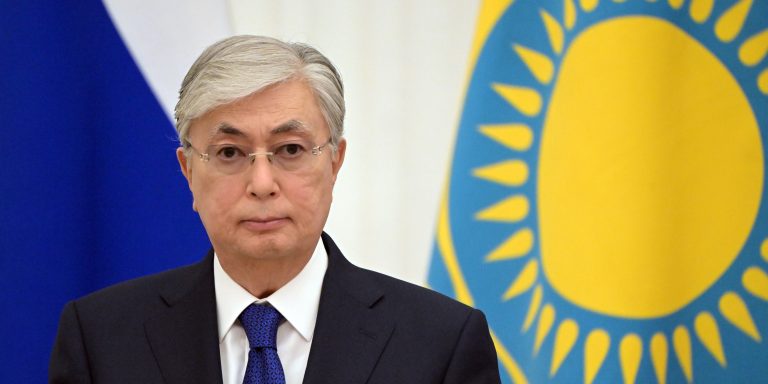INTELBRIEF
July 13, 2022
IntelBrief: Kazakhstan Wary of its Russian Ally after the Invasion of Ukraine

Bottom Line up Front
- Although careful not to provoke Moscow, Kazakhstan’s leaders have signaled that they oppose the decision to invade Ukraine.
- Kazakhstan’s leaders have calculated that Russia is likely to remain isolated diplomatically and economically for the indefinite future.
- The same justifications Russia used to invade Ukraine could potentially be used to encroach on Kazakhstan’s territory.
- Russia cannot count on Kazakhstan to help it circumvent Western sanctions.
Like many other post-soviet and Russia-aligned states, Kazakhstan has sought to calibrate its response to the Ukraine invasion in order to maximize its diplomatic options without provoking President Vladimir Putin. Since its 1991 independence, Kazakhstan has weaned itself from Russian patronage to become a significant Central Asian power and energy exporter. Kazakhstan has the world’s twelfth-largest proven oil reserves and is fourteenth for reserves of natural gas but profiting from those resources has proven difficult. Unlike most other major producers, Kazakhstan is landlocked, making it cumbersome to bring the fuel to market - particularly in Europe. At the same time, the country is attempting to reform its political system after more than three decades of absolute rule by former President Nursultan Nazarbayev, who resigned from the post of President in 2019 and was replaced by Kassim-Zhomart Tokayev. Constrained by Nazarbayev’s lingering authority and thus unable to enact much needed reforms, Tokayev’s government faced a major uprising in January 2022, when increases in fuel prices sparked widespread unrest and protests against economic concentration in the hands of elites. The rebellion - the most serious since independence - enabled Tokayev to remove Nazarbayev from the last of his official positions, but also forced Tokayev to request Russian military assistance to help quell the violence. The Russian deployment was officially in accordance with its responsibilities under the Collective Security Treaty Organization (CSTO), which includes Russia, Armenia, Belarus, Kazakhstan, Kyrgyzstan, and Tajikistan.
Reflecting Tokayev’s desire to increase economic linkages with the West and major economic powers in Asia, Tokayev did not show gratitude for Putin’s January assistance by expressing support for his decision to invade Ukraine. Kazakhstan abstained on the early March U.N. General Assembly resolution condemning the invasion of Ukraine. Subsequently, Tokayev has made clear that he does not support the rationale for the attack. During a panel discussion with Putin in St. Petersburg on June 17, Tokayev replied to a question about the Russian military intervention in Ukraine by stating that Kazakhstan does not and will not recognize quasi-state territories and that for Kazakhstan those included Luhansk and Donetsk. Most regional experts and diplomats interpreted the statement as reflecting Kazakhstan’s calculation that Russia will likely remain isolated on the global stage indefinitely, and Kazakhstan would prefer to avoid guilt by association. Alternatively, Kazakhstan’s leadership might assess that Western support for Ukraine will render the Russian invasion a failure and that Putin will be left humiliated. Furthermore, Kazakhstan has a substantial ethnic Russian minority in its northern regions, which border Russia. Kazakh leaders are rightfully concerned that Putin may use the presence of this population to justify future irredentism against them.
Tokayev has no interest in provoking Putin - an action Kazakh leaders fear could subject them to a fate similar to that of Ukraine. Both Nazarbayev and Tokayev have expertly balanced their relations with the great powers – China, Russia, and the U.S. – in order to guarantee Kazakhstan’s continued economic growth and relative independence from Russia. Tokayev immediately sought to deny that his comments in St. Petersburg indicated a break with Moscow. He subsequently stated that Kazakhstan continues its allied duties with Russia, including remaining in Russian-led international organizations like the Eurasian Economic Union and the CSTO. Nor has Kazakhstan interrupted any of its defense and security or scientific partnerships with Russia, such as the bilateral agreement which allows Russia to base its national space program in Kazakhstan at the Baikonur Cosmodrome.
U.S. and allied officials are evaluating the practical significance of Kazakhstan’s responses to the Russian invasion. It appears Tokayev and other leaders assess Kazakhstan’s economic future lies in expanded engagement with the West, China and other economic powers in Asia - rather than with Russia. In a June 15 interview with Russia's Rossia-24 TV, Tokayev vowed that Kazakhstan would not break international sanctions imposed against Russia over its invasion of Ukraine. He stated that his country continued to work with the Russian government in an "intensified manner," but quickly added that "sanctions are sanctions." He went on to say: "We cannot violate [the sanctions], especially because we receive warnings about possible so-called secondary sanctions against our economy from the West if we did violate the sanctions." The government has confirmed that it has complied with U.S. sanctions on Russian banks, freezing some $21.6 million in assets. The Kazakh government’s position reflects, at least in part, the country’s emergence as a significant supplier of oil to China. Western technology helped Kazakhstan overcome hurdles in developing the large Kashagan oil field in the Caspian Sea, whose exploitation was initially hampered by logistical and other difficulties. Nur-Sultan does not want any of its lucrative energy export arrangements - or the supply of key technology - jeopardized by accusations that it is helping Putin circumvent Western sanctions. Indications that the Kazakh government wants to distance itself from Putin and the invasion of Ukraine add another adverse consequence of the invasion to a long list of mounting setbacks for Moscow.